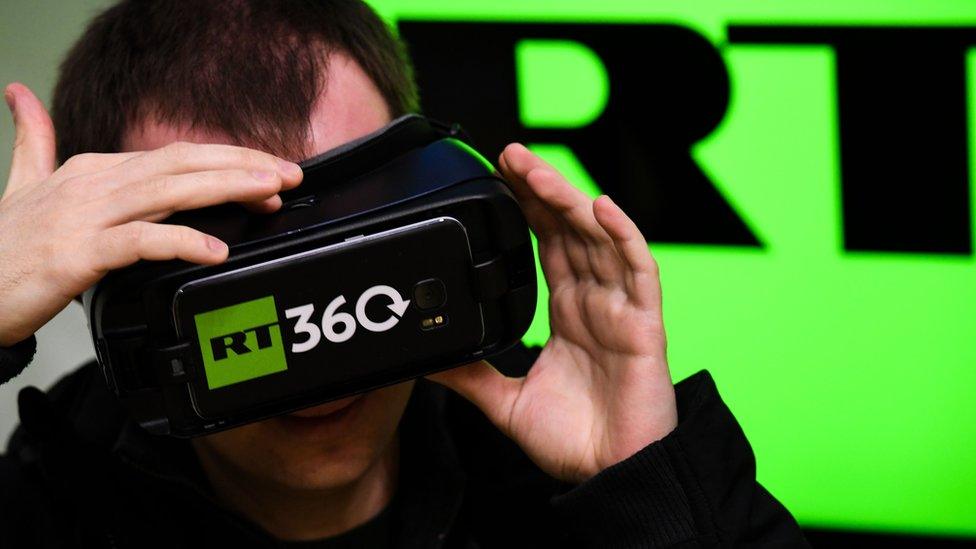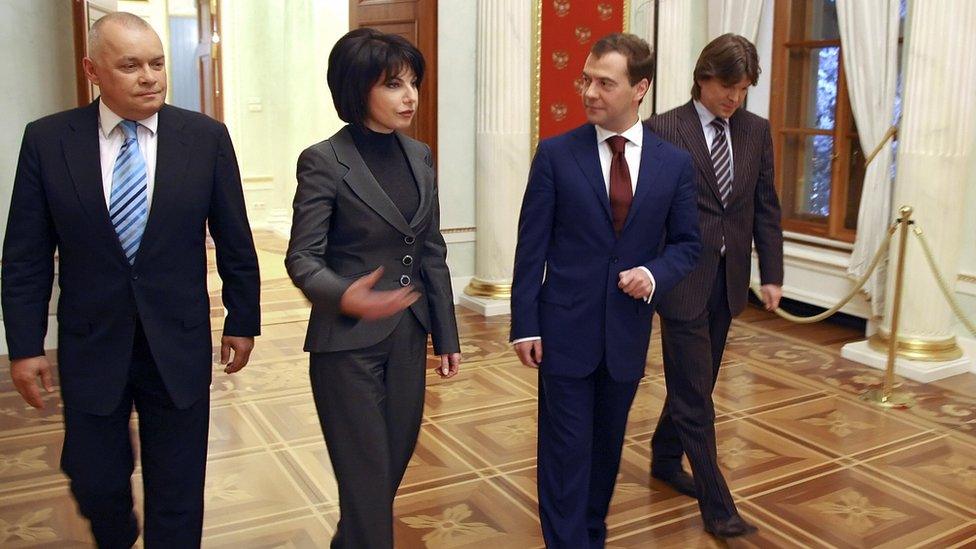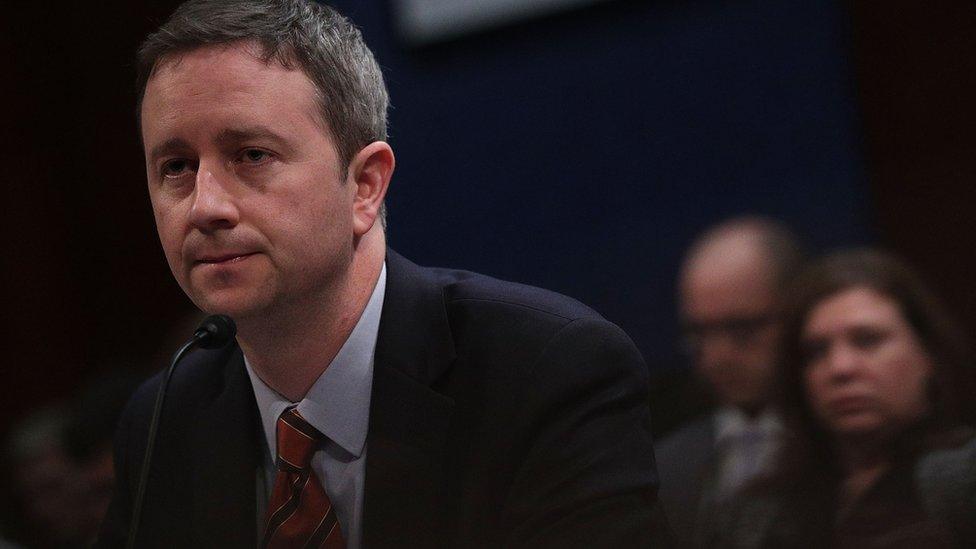Why has RT registered as a foreign agent with the US?
- Published

A man tries on a VR goggles at the RT stand during Russian Internet week
News outlet RT has registered as an agent of a foreign government in America, after years of accusations that it was a propaganda arm of the Russian government. So what is RT and why has it become the subject of fierce debate in the US?
It was a late February afternoon, when millions of Americans' phones and laptops started buzzing with breaking news from the White House.
"Gen Flynn was fired amid the scrutiny..."
"The White House national security adviser fired..."
President Trump had asked National Security Adviser Michael Flynn to leave the White House, said the reports. Flynn had misled Vice-President Pence about his contacts with then-Russian ambassador Sergey Kislyak.
It was the first resignation in the new presidential administration. But one media outlet, RT, reported it differently: "General Flynn retires as National Security Adviser"
Misleading headlines are only one part of RT's approach to news, which makes the American government and analysts believe it is just an arm of the Kremlin.
What is RT?
RT, originally Rossiya Segodnya (Russia Today), began broadcasting internationally in 2005 in English, Arabic and Spanish as a subsidiary of RIA Novosti, one of three Russian state-owned news broadcasters.
The broadcaster focused on Russia-related news reports and said its goal was to improve the image of the country in the US. At its launch, it promised a "more balanced picture" of what Russia is.
Several years later, it shortened its name to RT and began focusing on US news, positioning itself as an alternative to US mainstream media on both online and US cable television.
In late December 2013, Russian President Vladimir Putin dissolved RIA Novosti and transferred all its subsidiaries to a new organisation, International News Agency Russia Today.
On the same day, Putin appointed a well-known but controversial media figure, Dmitry Kiselev, as the general director of the new organisation.

Dmitry Kiselev and three other presenters interviewing Prime Minister Medvedev in 2008
Mr Kiselev was placed on the EU's individual sanctions list in 2014 for being a "central figure of the government propaganda supporting the deployment of Russian forces in Ukraine", including false claims of US State Department involvement.
He is also known for his homophobic views, including saying gay people should be banned from being blood or organ donors.
"In case of car accidents, their hearts must be buried or burnt and never used to save someone's life," he told Russian TV show in 2012.
A few American media personalities, the most prominent being Larry King, have presented programmes on RT America's television network.
What's the evidence of their Russian government connections?
"The edge between journalism and propaganda is very thin, especially, if we are talking about the media which is founded by the government," says Lata Nott, the Newseum Institute's executive director.
"Not all materials of RT are propaganda, but it is very clear that they have only one angle and they have never criticised their own government."
RT's major problem, Nott says, "is lack of transparency regarding sources of their budgeting".
It is all very unclear.
RT uses production companies to produce content for an American audience. The company operates the same way in the UK.
The production company registered with the US government, T & R Productions LLC, is owned by Mikhail Solodovnikov. But a recent report by the Atlantic Council, external named two different production firms in the US, both owned by Russian-born businessman Alex Yazlovsky.
In the registration, external, Solodovnikov notes his firm's funding comes from TV Novosti, and admits the Russian government finances the organisation. But Solodovnikov also says he is not "sufficiently aware of who supervises, owns, directs, controls or subsidises" TV Novosti.
RT doesn't make its supervisory board public, according to the Atlantic Council report, and while it reports annually to the Russian Ministry of Press on its expenditures, their financial statements are not made public.
American intelligence agencies have a low opinion of the network. Ex-CIA director James Clapper has called RT "a mouthpiece of Russian governmental propaganda," whose assets and executives are closely tied to Vladimir Putin.
An unclassified version of a January US intelligence report, external points to RT and Russian-backed website Sputnik as a key part of Russian interference with the US election, arguing the outlet served "as a platform for Kremlin messaging".
"The Kremlin staffs RT and closely supervises RT's coverage, recruiting people who can convey Russian strategic messaging because of their ideological beliefs," the report states.
It also details close links between editorial management and the Russian government and cites RT and Sputnik's ramping up of pro-Trump and anti-Clinton stories around March 2016, including Russian talking points that Clinton's election would led to a war between US and Russia.
What happened between RT and Twitter?
Twitter recently banned RT from advertising on the platform, citing the CIA report, said they will invest $1.9m they received from the outlet from advertising to support research into limiting misinformation on the platform.
However, RT Twitter accounts are not banned from Twitter.

Sean Edgett, acting general counsel at Twitter, answered questions in front of Congress last week
RT has accused Twitter of "forgetting to tell the US Senate it pushed RT to spend big bucks on election ad campaign", sharing an advertising pitch Twitter had made to RT, and accused the platform of being part of a "coordinated attack on Russian media and freedom of speech".
What's FARA and why is the US government forcing RT to register?
The US government requires all agencies, individuals and organisations controlled or funded by international governments and undertake political activity, to be registered with the justice department under the Foreign Agents Registration Act (Fara).
Fara began as a reaction to attempts by Nazi Germany to spread propaganda inside the US. In the 1940s, the Soviet news agency TASS and later newspapers Izvestia and Pravda were registered as agents of the Soviet government.
Since the law was enacted, 221 Russian companies have registered as foreign government agents, including a travel agency, a postal service and numerous financial institutions.
RT claims that it is a "publicly funded" media outlet, similar to the BBC or Germany's Deutsche Welle and would qualify for an exemption.
But to prove the exemption, the Atlantic Council writes, RT would need to disclose its finances, board members and show evidence of editorial independence from the Russian government.
Other international media outlets are registered as agents of foreign governments, including China Daily, NHK Cosmomedia, and KBS Korean Broadcasting System.
This week, RT decided to register under Fara.
"Between legal action and registration (as a foreign agent), we have chosen the latter," tweeted RT editor Margarita Simonyan.
"Congratulates the US [on its] freedom of speech and all those who still believe in it," Simonyan added.
Registering as a foreign agent doesn't mean RT will be forced to stop broadcasting, but it will need to label all US material "on behalf of" the Russian government.